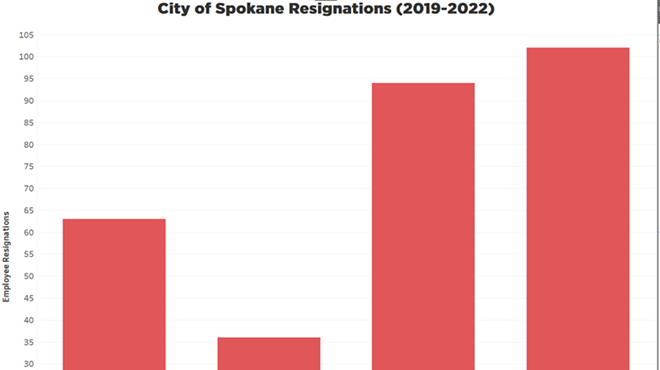
It was the kind of basic request for an update from the city staff that council members have made a hundred times throughout the years. City Council President Breean Beggs says it wouldn't take staff more than five minutes. They put in the request Monday. But by Wednesday, they got a surprising response from the administration: Nah.
"Due to current assignments and projects, staff is unable to provide a report and presentation regarding rental assistance during a study session on Thursday, July 1," wrote City Administrator Johnnie Perkins in an email to the council, adding that the presentation could be rescheduled for an unspecified later date when the staff had more time to prepare. "Thank you for the support and working with staff to ensure deadlines for assignments and projects are being fulfilled."
That's not the usual response.
This week, some Spokane residents are being notified by their landlords of massive rent increases. But councilmembers at Thursday's study session expressed deep frustration that they wouldn't be able to answer questions from their constituents.
While Woodward administration spokesman Brian Coddington cites a tight timeline as reason for the canceled presentation, Beggs notes that the presentation has so far not been rescheduled.
Lately, this kind of frustration has become commonplace for council members. It's not even the only example of the City Council feeling stonewalled by the Woodward administration in the last week.
"I could do all this on my own without bringing anybody else along. But that's not the way I want to do it," she told the Inlander last year. "I'm more of a consensus-builder."
But that dynamic has shifted, several City Council members say, with a noticable shift away from clear communication and collaboration between the two branches.
As during the roughest moments of the Condon administration, Councilwoman Karen Stratton says she's heard that "employees feel like they're stuck between council and administration," and she suggests that some employees have been restricted from talking to council members.
"I haven't seen a change at all," Woodward tells the Inlander. "I have great relationships with the council."
But multiple council members suggested that the change was obvious.
Cathcart says he hears from councilmembers frustrated with the administration, and members of the administration frustrated with the council.
"I just want to get stuff done, and everyone is fighting," Cathcart says.

"A lot of what's going on here is there are new people," Beggs says. "They don't understand the culture of how we've worked together before."
Still, he says he can't tell whether Perkins is responsible for the change in tone or whether he's responding to a new directive from the mayor.
"She had never complained about it before," Beggs says, "And when I talked to her about it, she shared with me that what she really wanted to do was demonstrate a contrast between her and the City Council."
Indeed, when the mayor held a press conference about her homelessness strategy in June, Beggs noticed that not only had the councilmembers not been invited, but the conference had been scheduled during their Thursday study session. They couldn't go if they wanted to.
Last month, Beggs said that he asked the administration about the apparent snub, but couldn't get a clear answer.
That tension was further inflamed when Cupid Alexander, Woodward's neighborhood services director, resigned last month. Alexander left with a flurry of criticism against Perkins, accusing the city administrator, among other things, of stonewalling him and refusing to respond to important emails.
City Council members cited similar experiences.
In fact, in one email Alexander forwarded to the council, he alleged that the administration had intentionally been holding back a homelessness report from the City Council so it didn't "disrupt" the mayor's housing and homelessness plans, "as other entities were prepping to attack" it.
While that report has since been released — contradicting Woodward's claim that the report concluded there wasn't a need for more homeless shelter space — Beggs says the council still has questions about the city's homeless shelter data that haven't been answered, despite the council asking repeatedly.
"The honeymoon might be over," she says.
In another recent incident, a council initiative, months in the works, was suddenly stopped dead.
Beggs says the council wanted to recruit a firm to study how many short-term rentals — like Airbnbs — were in Spokane. Considering how few rooms were available to rent in Spokane, the council wanted to figure out how many potential rental units had been converted to Airbnbs, serving visitors instead of renting to residents.
But Perkins informed them that the initiative would be put on hold, using almost identical language that he used to inform the council that they wouldn't be getting a rental assistance update.
"Due to current assignments and projects, staff is unable to develop a Request for Proposal regarding Short-Term Rentals," Perkins wrote. "We will be able to further discuss this later this fall around October. Thank you for the support and working with staff to ensure deadlines for assignments and projects are being fulfilled."
The council had been working with city staff on the issue since April.
"Now, the City Administrator slams on the brakes," Brian McClatchey, the City Council's director of policy and government relations, complained in an email.
"I think what we're trying to do is just give our staff time to do their work," Woodward says. "And if it takes a little more time to get answers to council now, we've got to give them the time to do it."
And if the City Council has any complaints about that, she says, she hasn't heard from them.
"None of the council has said anything to me about it," Woodward says. "They talk to me all the time, but they haven't expressed that."



























